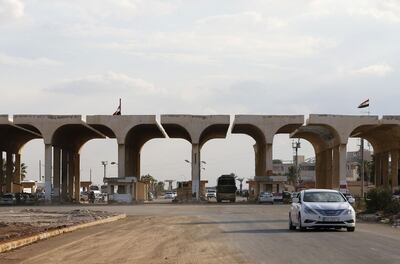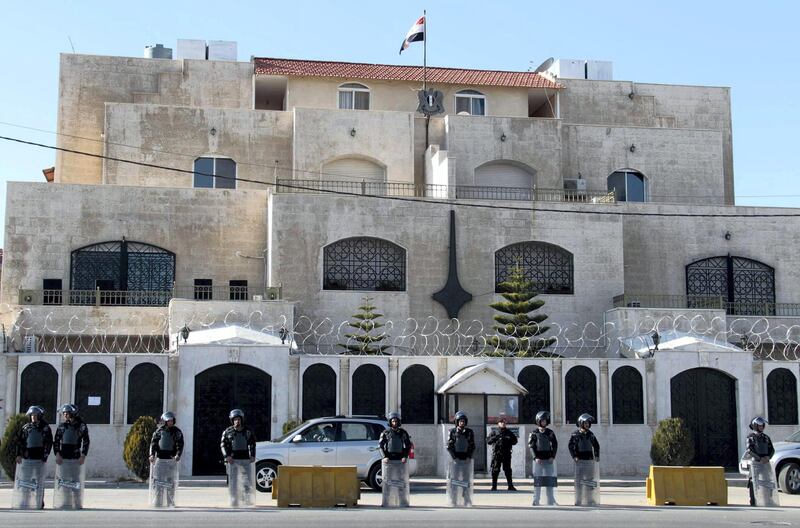Jordan has become the latest regional country to re-establish diplomatic ties with Syria.
Jordanian Foreign Ministry spokesman Sufian Qudah said Amman had appointed an acting charge d’affaires at its embassy in Damascus.
Government sources say the diplomat has been asked to increase trade and business relations with Syria.
The sources said he would explore opportunities for Jordanian business owners and investors to help in Syria’s reconstruction.
Jordan has been without an ambassador in Syria since 2012, and despite the two countries keeping embassies open throughout the conflict, relations have been at times frosty.
Amman has been hosting rebel fighters and co-ordinating with them in southern Syria, which Jordanian officials stress was at the behest of its western allies.
Syria has been without a representative in Amman since May 2014, when Jordan expelled Bahjat Suleiman for “interference in internal affairs” and “repeated insults” to Jordan and its leadership.
In response, Syria expelled Jordan’s charge d’affaires.
Despite this, the two countries co-operated closely over their 380 kilometre border.

Diplomatic ties are being re-established three months after Jordan reopened its border with Syria.
“Whether or not a regional rapprochement occurs with the Syrian regime, it is in Jordan’s interests to improve diplomatic ties with Syria for the economic opportunities of reconstruction and trade,” said Fares Braizat, chairman of Jordanian think tank Nama Strategic Intelligence Solutions.
The Nassib crossing alone provided $1.5 billion (Dh5.5bn) in annual trade before the war, while logistically, Syria and Jordan are crucial to each other.
______________
Read more:
Activists accuse Syrian government of arresting returnees
With two still missing in Syria, Jordanians wary of using Nassib crossing
Freezing temperatures kill eight children in Syria's Rukban camp
______________
Syria remains Jordan’s only overland route towards the West through Turkey, providing the cheapest access for goods to Europe, which imports Jordanian produce in winter.
And Jordan hopes its Red Sea port of Aqaba can become the entry and exit point for trade between Asia and Syria.
A Jordanian parliamentary delegation travelled to Damascus to meet President Bashar Al Assad in November.
Since they returned to Amman they have lobbied relentlessly for Jordan to reinstate its ambassador. They say the interest in resuming ties is mutual.

Politicians who met Mr Al Assad discussed energy co-operation, reviving and extending the Arab Gas Pipeline that runs from Egypt through Jordan to northern Syria, logistics and transport of goods and services between Europe and the Gulf.
Damascus has also received delegations from Jordanian contractors and engineers to explore opportunities in rebuilding infrastructure, roads, electrical grids, water networks and housing projects.
Jordan’s involvement in rebuilding Syria and reviving the trade routes between the region and Europe would be an economic lifeline for the kingdom.
Jordan suffers near-record 18.6 per cent unemployment, is mired in a debt crisis and has continuing protests and economic unrest.
“We are trying to open as many economic spaces to allow our citizens to breathe,” said Qais Zayadin, a Jordanian politician who was part of the delegation.
“From an economic perspective, it is vital for us to reset this relationship.”
Jordanian officials hope that strengthened ties and an improved security situation in Syria will encourage the return of some of the 1.3 million refugees who have fled to the kingdom.
In the three months since the Nassib border with Syria was reopened, 20,000 Syrians have gone home, various statistics show.
But the UN has confirmed only about 6,000 refugees returned.
There has been a rapid thaw in ties between Syria and much of the Arab world. The UAE reopened its embassy in Syria last month with other Gulf states expected to follow.
There has been a push for the Arab League to readmit Syria – which was suspended in 2011 over the killing of protesters, in time for the March Arab Summit in Tunis.
Sources say Jordan and have been leading the quiet campaign for Syria’ reinstatement.





